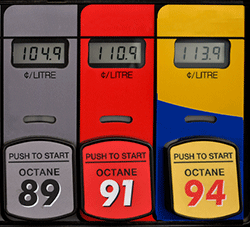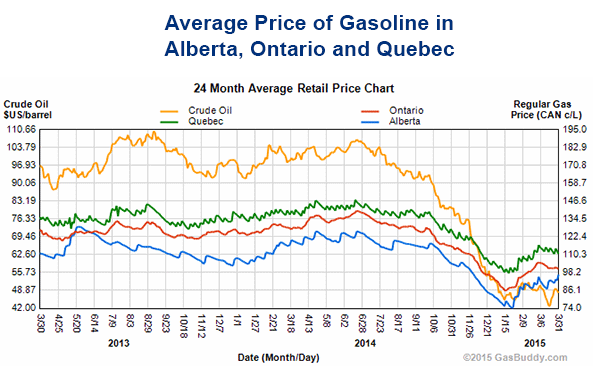
Gas prices are about 20 per cent cheaper than they were this time last year and a KANETIX.ca survey reveals that more than half (56 per cent) of Canadians feel they've got more money in their wallet because they're spending less at the pumps. But, will cheaper gas have an impact on our driving habits?
Will Cheaper Gas Prices Mean We'll Drive More, Take Public Transit Less Or Buy A Bigger Vehicle?
Not necessarily. The majority of us do not plan to make any changes as only 19 per cent plan to drive more; 23 per cent are less likely to take public transit; and, only 11 per cent are considering getting a larger vehicle (like a truck or SUV).

Lower Gas Prices=More Traffic Congestion?
Even though most of us plan to keep the status quo going, it's hard to ignore that two in 10 people say they'll drive more and 23 per cent say they'll take public transit less. Congestion is the bane of many large cities so does this mean we can expect to spend more time in the car than we already do? Perhaps, and it plays into the concerns of three in 10 (29 per cent) who worry that lower gas prices will result in more congestion.
Big Wheels
With gas costing less, 11 per cent of drivers are mulling around the idea of getting a bigger vehicle, in theory a less fuel-efficient vehicle. While gas prices today are nowhere near the high they were in June 2014 (according to Natural Resources Canada the average cost of regular gasoline was $1.41 per litre), it's prudent to remember that gas prices can fluctuate wildly both ways-higher and lower. With the exception of the last few months, gas has typically been north of a buck ten.
- Related Read: Canada's Best SUVs: Top Selling 10 SUVs In Canada
- Related Read: Top 10 Trucks In Canada
- Related Read: Which Cars Hold their Value the Best?
Paying For Gas Is Right Up There With Paying For Auto Insurance
Gas, like auto insurance, is one of those expenses that drivers need to factor into their budget, and even though gas prices are lower today than they were say 6 months ago, practising fuel efficient driving techniques, can save you even more:
- Avoid hard, fast acceleration and hard braking.
- Slow down. On most major Canadian highways the posted limit is 100 km/h. If you prefer a cruising speed however around 120 km/h, not only might you be cruising your way into a speeding ticket (thereby increasing your car insurance rates) but you are also increasing your vehicle's fuel consumption by about 20 per cent.
- Don't let your car become a storage room on wheels. While it may seem convenient, it's estimated that for every additional 100 pounds in your vehicle you are reducing your fuel efficiency by about one per cent.
- Keep your tires properly inflated so that your car runs at its best.
- Use the manufacturer's recommended grade of motor oil as this will improve your gas mileage by 1-2 per cent. Use anything else and you're not getting all you can from your car.
And, if gas savings is important to you, then don't overlook the savings to be had on your car insurance. Like gasoline, the price of auto insurance can vary wildly. Fill up your savings potential today, and compare car insurance rates because on average, our customers save $750. See if you could be saving too and compare car insurance quotes today.
Gas-saving tips list compiled from information found on the websites for Natural Resources Canada and the U.S. Department of Energy.




